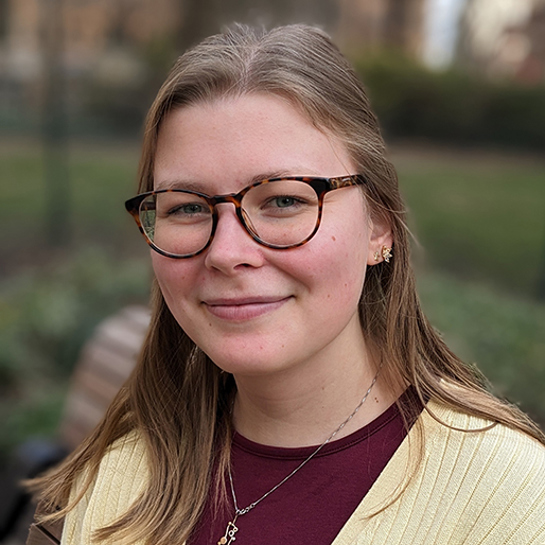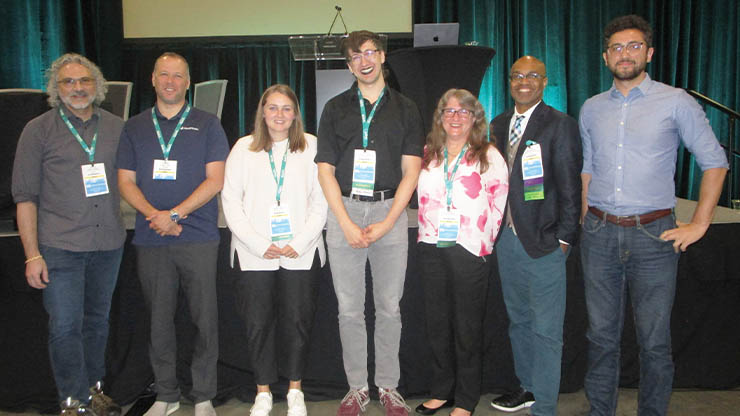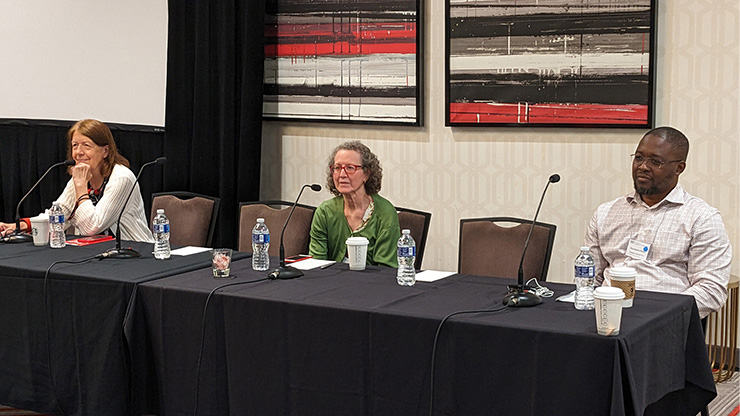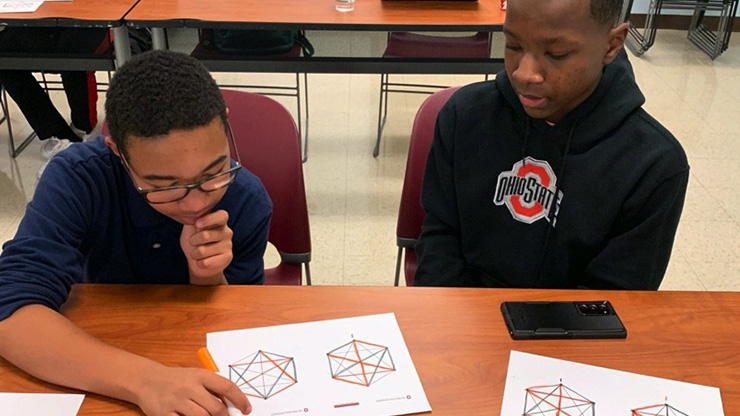Film Screening and Discussion at AN24 Focus on the Journeys of Black Mathematicians
Despite continuing strides in equity, diversity, and inclusion (EDI), very few Black mathematicians are awarded Ph.D.s each year. According to the American Mathematical Society’s Mathematical and Statistical Sciences Annual Survey, less than three percent of individuals who received doctorates in the mathematical and statistical sciences from 2017 to 2018 (the last period with available data) identified as Black or African American [1]. In response to this stark disparity, the Simons Laufer Mathematical Sciences Institute and ZALA Films jointly commissioned a documentary titled Journeys of Black Mathematicians: Forging Resilience. The film, which was created by George Csicsery, features interviews with Black mathematicians and current students who discuss their experiences in academia; affirm the importance of historically Black colleges and universities; and describe ongoing education, outreach, and community-building initiatives.
At the 2024 SIAM Annual Meeting, which took place this July in Spokane, Wash., the Workshop Celebrating Diversity organized a screening and discussion of Journeys of Black Mathematicians. Gonzaga University’s Institute for Informatics and Applied Technology sponsored the event, which began with a showing of the hour-long film. Ron Buckmire of Marist College—the SIAM Vice President for EDI—then chaired a conversation about the themes of the documentary with panelists Reginald McGee of Haverford College, Bonita Saunders of the National Institute of Standards and Technology (who was featured in the film), and Nathaniel Whitaker of the University of Massachusetts (UMass) Amherst.

Overall, the panelists reacted positively to the film. Saunders—who was born the year that the U.S. Supreme Court handed down its Brown v. Board of Education decision that declared the unconstitutionality of racial segregation in public schools, and who attended all-Black schools until eighth grade—enjoyed hearing the stories of Black mathematicians who had charted a path through the historically exclusive field. “I think that it’s important to know the history of Black people and see what they went through to get where they are,” she said. She was particularly impressed by the film’s interview with Evelyn Boyd Granville — a mathematician who was involved in the early days of the Space Age, and who passed away last year at the age of 99. Saunders recently published a tribute to Granville in MAA Focus—the news magazine of the Mathematical Association of America—and noted that Granville’s story exemplified the impact of high-quality education for Black people throughout history [2].
Whitaker, who also attended segregated schools until ninth grade, thought that the film could be very impactful for Black students at predominantly non-Black institutions, as these students may not encounter many role models in their day-to-day lives who share their same backgrounds and experiences. “I think that this movie is a good means of showing [those role models] to students,” he said. Young people may find it easier to envision their own paths when they have concrete examples of other people like themselves who found success in mathematics or similar fields. “It was very inspiring,” McGee added. “At this point in my career, it helps me to become reinspired.”
SIAM and other professional organizations offer camaraderie and support to uplift underrepresented minorities. Panelists mentioned SIAM’s multiple opportunities for funding, networking, and visibility, including travel awards and the MGB-SIAM Early Career Fellowship (a joint program with Mathematically Gifted & Black); other organizations such as the Math Alliance provide similar benefits. Participation in conferences or special events can also help researchers connect with compatriots who are pursuing similar career goals. “Going to conferences through societies is an important way to be in the community and get organized,” McGee said. “Get out in fellowship and find community.”
Saunders, who joined SIAM as a graduate student, agreed that professional societies and meetings serve as useful avenues for junior scientists to explore different careers and receive encouraging pep talks. “Being in these societies impacts your career,” she said. “It gives you an opportunity to meet people like yourself, start collaborations, and see what others do to succeed.” Whitaker concurred with the value of these occasions in expanding one’s world. “One of the most important things for mathematics is being part of a community,” he said.
Next, audience members inquired as to how non-Black mathematicians can better serve as allies. McGee urged attendees to remember their Black colleagues for prize nominations and other openings to advance their careers. “Keep them in mind for opportunities that they may be overlooking,” he said. Meanwhile, Saunders focused on the need to foster healthy, assured workplace settings. “Make sure that you create an accepting environment so Black mathematicians feel comfortable talking to you,” she said. “Be open to listening to them and putting yourself in that person’s shoes.” And if someone makes a racist comment about another person behind their back, Saunders advised listeners to handle the situation as discretely as possible, since telling the subject about the event could be emotionally devastating. She also asked everyone to remain cognizant of how current news events or happenings within an organization may affect colleagues from different backgrounds. “Get to know other people who don’t look like you so that you know what’s going on in their lives,” she said.

Journeys of Black Mathematicians portrayed a generally positive, robust trajectory for EDI in the mathematical sciences, and attendees were curious whether this portrayal aligned with the panelists’ own experiences. Saunders admitted that the movie made it seem a bit too easy to inspire children to study mathematics, especially given her own efforts with tutoring. “I think that we need a lot more concentration on the elementary and middle school level,” she said. “If that elementary education isn’t solid, those kids can’t get to where you are.” Similarly, Whitaker helped to establish and run a Saturday morning program that encouraged kids to elevate their math skills — inspired by his observation that the academic pipeline did not produce many Black faculty candidates when he served as dean at UMass Amherst.
The panelists then commented on the ways in which people with different racial identities can contribute to EDI programs and initiatives. For instance, Whitaker recounted his experiences as a Ph.D. student at the University of California, Berkely, which at the time did not have any Black professors within the department but did enroll many Black students. It was thus necessary for other people to become involved and uplift these students. “If I had to depend on Black mentors, I wouldn’t have been able to because there were not that many,” Whitaker said.
Buckmire confirmed that there is no one correct solution or means of contribution, and programs and organizations that are not racially specific can also have an impact in tandem with more targeted initiatives. “Many flowers can bloom,” he said. “There’s lots of work to go around.” However, some efforts—such as serving as a role model for children from the same background—can only be taken on by people within a specific community.
Finally, the panelists addressed the difficulty of balancing the pressures of an early career with the goal of advancing EDI. All of the speakers agreed that in academic settings, it is important to prioritize the acquisition of tenure in order to earn the power and license to incite positive change. But while assuming extra responsibilities can certainly be worthwhile, there is no need to rush and fit everything into what is ultimately the first chapter of a long career. “When you’re early-career, find a balance that works for you,” McGee said. He also advised listeners to connect with a community of individuals in whom they can confide when circumstances become rough. In difficult times, Whitaker compares his struggles to those of his ancestors to maintain perspective. “That should inspire you to say, ‘I can tackle these things,’” he said.
References
[1] Golbeck, A.L., Barr, T.H., & Rose, C.A. (2020). Report on the 2017-2018 new doctorate recipients. Not. Am. Math. Soc., 67(8), 1200-1213.
[2] Saunders, B.V. (2024). A tribute to mathematician Evelyn Boyd Granville: 1924-2023. MAA Focus, 44(3), 20-24.
About the Author
Jillian Kunze
Master's student, Drexel University
Jillian Kunze is the former associate editor of SIAM News. She is currently a master’s student in data science at Drexel University.

Stay Up-to-Date with Email Alerts
Sign up for our monthly newsletter and emails about other topics of your choosing.






